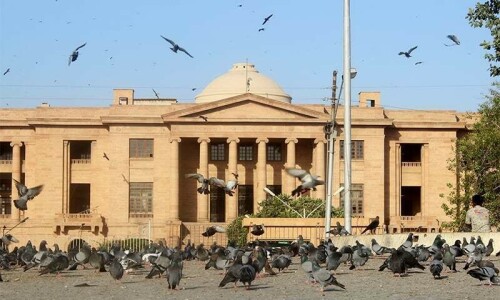MORE than two months after taking power, the Shehbaz Sharif government has yet to find its moorings. It is like a rudderless ship with many helmsmen trying to steer it in different directions. It has been lurching from one crisis to another, thanks to the complete absence of leadership. We are witnessing an extremely chaotic situation: a tottering dispensation is struggling to prevent an impending systemic collapse.
With the recent order of the Supreme Court suspending the ECP decision of granting extra reserved seats to the ruling coalition, the latter has been dealt a serious blow. Not only has the move reduced its strength in parliament, it has also opened a Pandora’s box. The ruling has raised a whole lot of legal questions about the recent elections in the Senate and other constitutional positions.
The loss of the coalition’s two-thirds majority has further limited the government’s capacity to legislate and take critical policy decisions. The ongoing court battles and a vociferous opposition challenging the legitimacy of the political set-up have worsened the predicament of the tenuous coalition. The establishment’s increasingly intrusive role has further diminished the credibility of the political dispensation. The situation is rightly being described as military rule with a civilian façade.
Equally damaging is the widening disarray within the cabinet and the failure to chart a coherent policy course on critical issues. The elevation of Ishaq Dar to the position of deputy prime minister has widened the cleavage. Having the blessing of Nawaz Sharif, Dar, who is also foreign minister, has overshadowed the prime minister. As was expected, he is now trying to find his way back to running economic policy.
An unsteady government is also using coercive action to silence dissent.
Dar’s increasing assertiveness in pushing his viewpoint has already put him at odds with the finance minister’s outlook on privatisation and other financial issues. He has publicly disputed Muhammad Aurangzeb’s opinion that it is not the job of the state to run commercial enterprises and the more quickly state-owned enterprises are privatised, the better it will be for the country’s economy. He seems to be stuck on preserving the state’s control over so-called national assets.
Curiously, the foreign minister is trying to influence matters that don’t come under his domain. Dar’s conflicting views also bring into question the Shehbaz Sharif government’s stated policy on privatisation and other economic reforms. Such statements by the deputy prime minister are likely to have implications for the government’s negotiations with IMF for a longer and larger bailout package.
It is not surprising, then, that in this confusion the government has yet to define how it plans to move forward on privatisation and economic reform in general. While there have been some positive indicators that show inflation is being contained, the economy is nowhere near the path of recovery. There is no sign yet of the much-touted $5 billion Saudi investment materialising. Foreign investment needs a conducive economic environment and a long-term economic policy that is still not in place.
Governance is another weak point of the PML-N-led government. Its mishandling of the protests in Azad Kashmir calling for a reduction in wheat and electricity prices was a glaring example of its incompetence. Instead of dealing with the angry protest rationally, the administration resorted to the use of force, resulting in fatalities. Although the government accepted the protesters’ demands, the damage had been done. Such gross mishandling turned the situation volatile in an extremely sensitive region.
Meanwhile, an unsteady government is also using coercive action to silence dissent. It is now working on a draft law to regulate social media on the pretext of preventing ‘hate speech and disinformation’. But most observers see the law as a move to curb the freedom of expression. The popular social media platform X remains blocked after widespread allegations of manipulation during the Feb 8 general elections.
Meanwhile, the government has formed a National Cyber Crimes Investigation Agency to probe electronic crimes. Most digital rights activists describe it as yet another attempt to stifle criticism online. All these moves demonstrate how fearful the government is of the power of social media, which has become the most effective forum for dissenting voices, given the restrictions on mainstream media.
It is not just about the media; the judiciary, too, is reportedly being intimidated by the intelligence agencies. The pressure on the judiciary has mounted after six judges of the Islamabad High Court sent a letter to the Supreme Judicial Council detailing their harassment at the hands of the intelligence agencies. In a recent letter to the Islamabad High Court chief justice, Justice Babar Sattar reportedly alleged “intimidatory tactics” on the part of the establishment after he issued notices to the heads of intelligence and investigation agencies in the audio leaks case. He also complained about the breach of his family’s personal data, in a blatant violation of the law.
Such pressure tactics have been applied on judges to get favourable rulings in the past too. But now the judges are speaking out. It is no secret who is behind the campaign against an upright judge who dared to speak out. Some politicians also appear to have been unleashed on the judiciary. It all seems to be part of a campaign to browbeat judges who refuse to toe the line. What is most shocking is that the law minister and some other members of the cabinet came out in support of the elements involved in the intimidation of judges.
The increasing harassment of the judges has intensified the clash between the establishment and part of the judiciary that refused to bow to pressure. The Supreme Court has issued suo motu notices to two lawmakers, seeking an explanation from them for their anti-judiciary vitriol — with little effect so far. It is now turning into an open stand-off between the two state institutions, adding to the chaos. It certainly doesn’t bode well for a dispensation struggling to establish its legitimacy.
The writer is an author and journalist.
X: @hidhussain
Published in Dawn, May 22nd, 2024














































